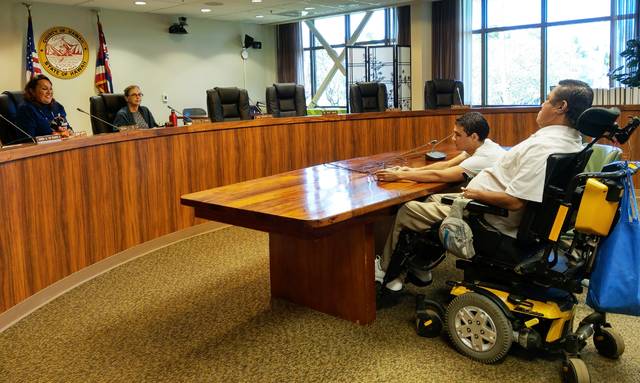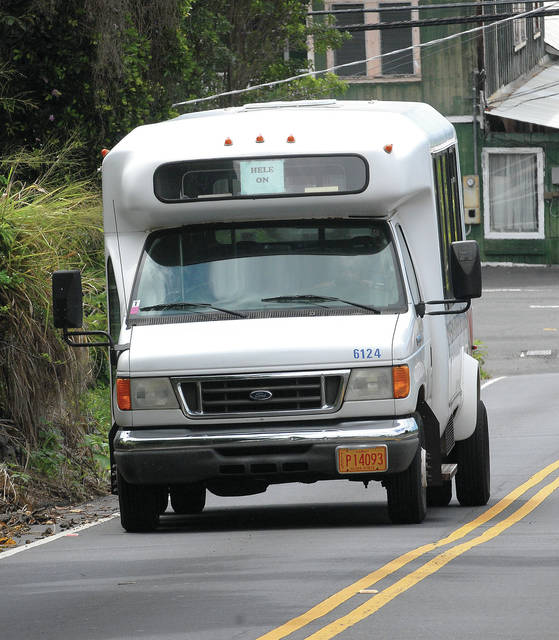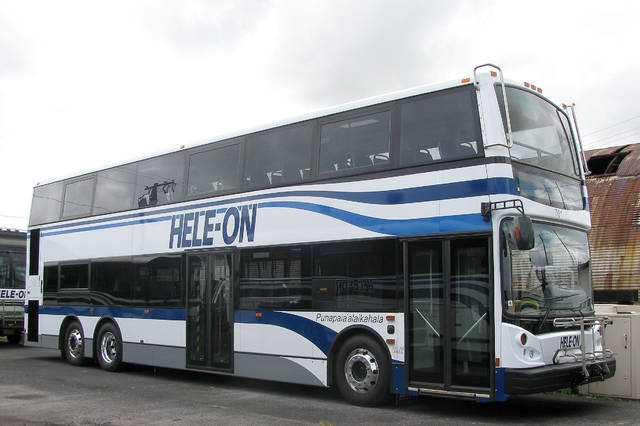Hawaii County will soon have not one, but two, double-decker buses running between Hilo and South Kohala, County Council members learned last week.
The county’s original double-decker bus, which arrived on the island in early 2010 at a cost of $900,000, broke down less than six months into the job and has been idling on blocks at the county base yard for most of the last seven years. It’s about ready to go back on the road, transit officials said.
The county also took possession of a donated double-decker bus from Maui last week that is currently being checked out at the county base yard, said Mass Transit Program Manager Tiffany Kai. The 2004 bus is in working condition but was donated because Maui found little use for it on its small island, she said.
Maui also donated a 25-passenger 2014 Chevrolet bus, Kai said. It cost Hawaii County $11,777 to transport the buses over, she said.
“They’re in very good condition,” Kai told the council Finance Committee. “The mechanics are still going through these vehicles to make sure they’re ready.”
Kona Councilman Dru Kanuha asked why Maui County decided to give them up, adding, “We want to mahalo Maui.”
Kai said Maui County is “very aware of what our situation is in,” and decided to donate them.
“The double-deck bus for Maui County wasn’t very useful to them,” she added.
The double-deckers will shuttle hotel workers from East Hawaii, where the cost of living is cheaper, to West Hawaii, where the resorts are. With the two decks, the bus can move twice the people at almost the same cost.
The smaller bus will be used on the Puna route, alleviating the need to pay daily rental fees on Polynesian Adventure tour buses as the county tries to rebuild its fleet.
The committee also received a status report on the county’s paratransit system for disabled riders. Many of the recent replacement buses and the Polynesian Adventure ones, can’t accommodate motorized wheelchairs, a situation that especially concerns rider Monotui Fuiava, of Hilo.
Fuiava depends on the paratransit vans and the taxi shared-ride program to get around following a 1989 motor vehicle accident that left him a quadriplegic.
“We have a desire, a responsibility as members of our community and being able to have that complete sense of belonging (is important),” he told the committee.”I remember I wanted to have a life, to pursue life and go to college and make a difference in my life and make a difference in my community.”
Fuiava, who was class president during his tenure at Hawaii Community College and then went on to the University of Hawaii at Hilo to pursue bachelor’s degrees, said the van schedules are limited and don’t run after 4 p.m. It cost him $50 each way to take a taxi the short distance from his home to the Hilo Civic Auditorium to attend an evening graduation, he said.
“What really helped me was the Hele-On bus; it was wheelchair accessible,” Fuiava said. “I would drive my chair in the rain sometime to go to work. … Having that Hele-On bus, it really accommodated me. … We’re fortunate to have those services. … But unfortunately we’re limited. …. Hele-On bus is really not wheelchair accessible right now. Today, I hope we could be able to support this program, so we can live life again.”
Ridership was up 32.6 percent on the paratransit system between 2017 and 2018, Kai said.
There are 87 eligible riders in Kailua-Kona
and 35 in Hilo, on the system that currently runs only in the population centers in each town, picking up riders within one mile of the fixed bus route.
The paratransit program cost $245,209 last year, averaging $83 per user per ride. The rider pays $4 each way.
The shared-ride taxi program cost the county $900,000 annually for both disabled and non-disabled riders. It operates only in Hilo, because it’s been hard to get Kona taxi companies to participate in the program, Kai said.
As for the paratransit program, planned improvements are to extend the hours of operation and expand services to Hamakua, North Kohala, South Kohala and the Ka‘u and Puna districts, she said.
“Mass Transit has a deep commitment to the disabled riders,” Kai said.
The Hele-On Kakoo paratransit service, offering door-to-door transportation for those riders who fill out a form and qualify, started in 2016 in Kona and Hilo. The county was required to institute a system as part of a settlement of a lawsuit by a Hele-On bus rider who couldn’t get his motorized wheelchair onto a fixed-route bus.











